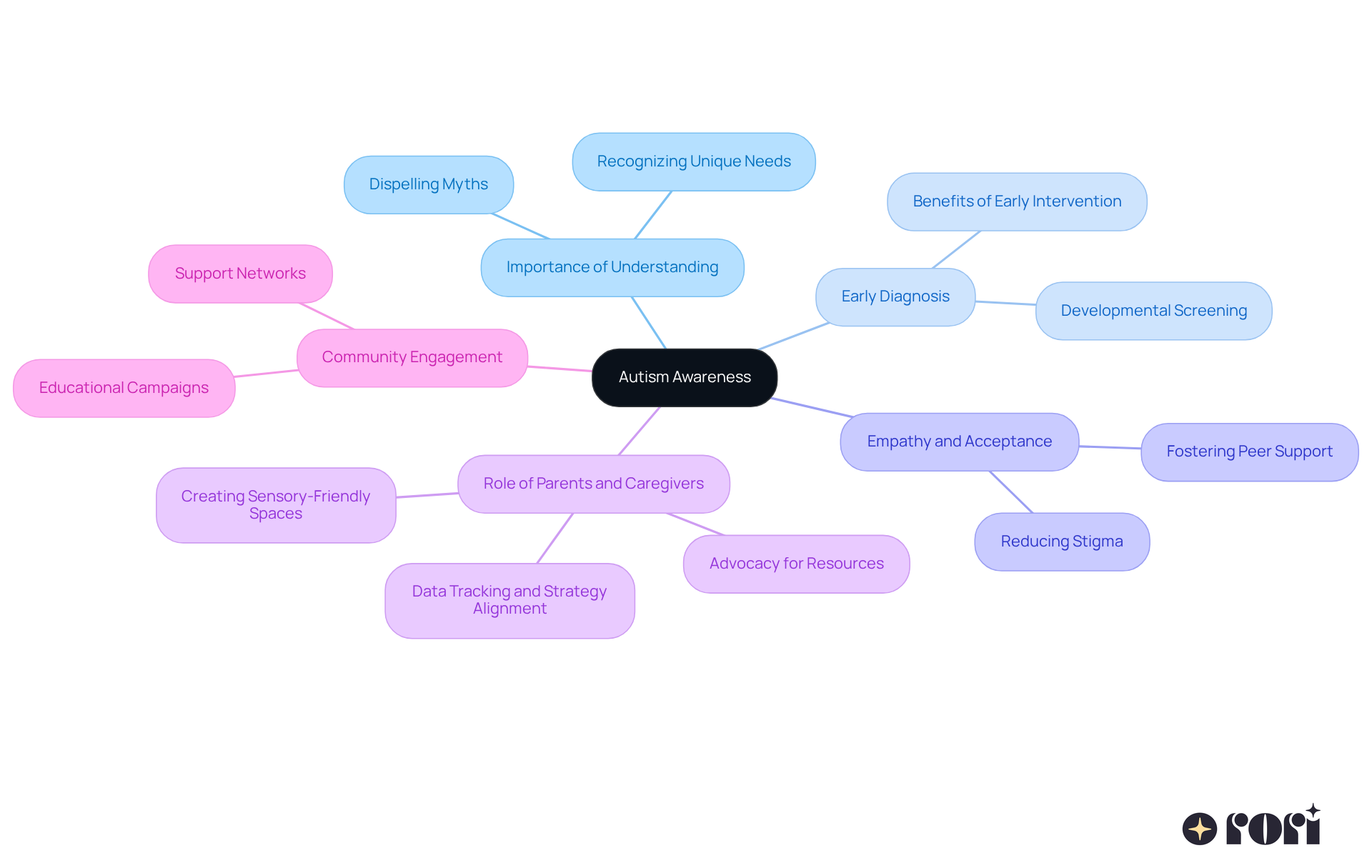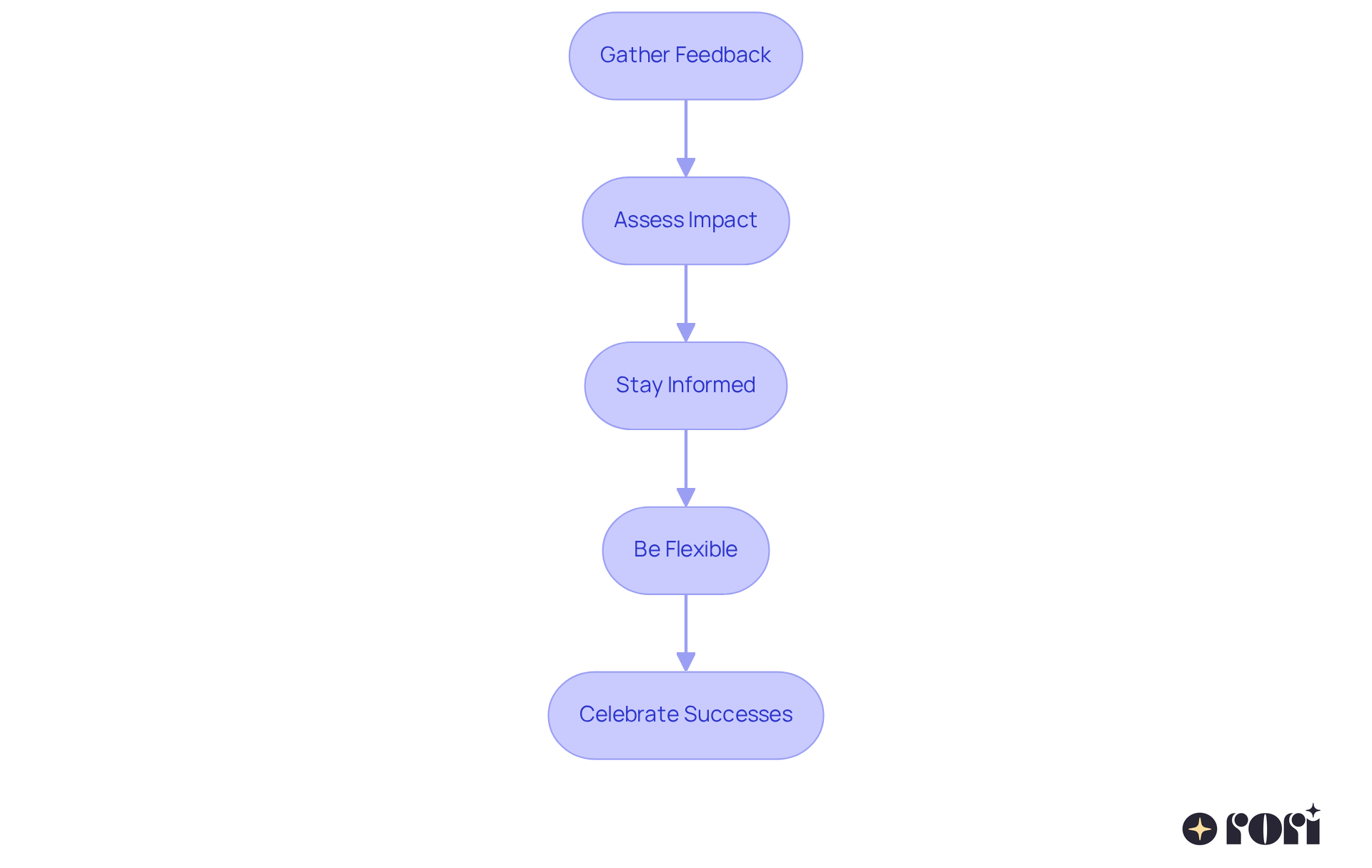Understanding autism is so important for creating a supportive space for individuals on the spectrum, but let’s be honest—misconceptions are still out there. This guide is here to share some practical strategies that parents can use to raise autism awareness in early childhood. By doing this, we can help pave the way for better outcomes for our kids.
So, how can families really engage their communities and advocate for inclusive practices that celebrate neurodiversity? Let’s explore this together! We’re all in this journey, and every step counts.
Understanding this condition is so important for helping everyone see the unique needs and strengths of individuals on the spectrum. By clearing up myths and misconceptions, we can create a more inclusive environment that benefits us all. Identifying the condition early is key for effective intervention, and raising awareness really helps with this. For instance, research shows that kids diagnosed with developmental disorders at a young age tend to do better in communication and social skills. When parents understand developmental disorders, they can advocate more effectively for their children, ensuring they get the support and resources they need.
Plus, grasping this condition helps foster empathy and acceptance among peers, which is crucial for reducing stigma and bullying—issues that many young people with this condition face. Studies indicate that kids with developmental disorders are more likely to experience harassment, making educational campaigns vital for building a supportive community. Parents should familiarize themselves with the traits linked to autism spectrum disorder and the importance of early intervention. This knowledge empowers them to take proactive steps in their child's development. By embracing autism awareness, families can help create a society that recognizes and celebrates neurodiversity.
At Rori Care, our clinical leadership team is dedicated to empowering caregivers with the knowledge and skills they need to support their loved ones' behavioral goals using ABA principles. This active involvement not only fosters a consistent and supportive environment but also maximizes the effectiveness of interventions. Parents should focus on gathering data and aligning strategies to keep track of their child's progress and adjust their methods as needed. Additionally, creating sensory-friendly spaces can help children on the spectrum feel more comfortable and reduce stress in various environments. By working with compassionate professionals, families can contribute to a society that truly recognizes and celebrates neurodiversity.

To promote awareness of developmental disorders, parents can try out some practical strategies that really make a difference:
Educate Yourself and Others: Start by diving into the world of autism. Grab some books, read articles, or attend workshops. Share what you learn with family, friends, and your child’s school. By doing this, you create a well-informed support network that can significantly contribute to autism awareness in early years.
Organize Awareness Events: Why not take the lead and host or join community events during Autism Awareness Month? Workshops and informational sessions can do wonders for improving public understanding and acceptance of autism awareness in early years. It’s a great way to bring people together!
Utilize Social Media: Social media is a powerful tool! Use it to share information, personal stories, and resources about developmental disorders. This can really expand your reach and spark a more inclusive conversation about autism awareness in early years.
Support Inclusive Approaches: Team up with schools and local organizations to promote inclusive practices for children with developmental disorders. This means encouraging staff education on these disorders and creating environments that cater to diverse needs. Together, we can make a difference by supporting autism awareness in early years!
Encourage open conversations: It’s important to create a safe space for discussing autism awareness in early years within your family and social circles. Encourage your child to share their experiences and feelings. This not only helps others understand but also fosters empathy and connection.
Let’s explore this together! Your efforts can truly make a difference in raising awareness and supporting those with developmental disorders.

Engaging with community resources can significantly enhance your efforts to promote autism awareness in early years. Let’s explore some effective strategies to connect:
Join Local Support Groups: Look for local support groups focused on developmental disorders. These gatherings are a great way to meet other parents, share experiences, and gain valuable insights. Plus, they often provide essential resources and emotional support, helping to ease feelings of isolation.
Collaborate with Neurodiversity Organizations: Partnering with local neurodiversity groups can be a game-changer. You can engage in outreach campaigns, workshops, and events together. These organizations usually have established programs and resources that can really enhance your advocacy efforts and boost public understanding of autism awareness in early years.
Utilize Online Resources: Don’t forget about the wealth of information available online! Websites like Autism Speaks and the Autism Society offer fantastic resources and community connections, making it easier to find support and information.
Attend Workshops and Training: Participating in workshops and training sessions offered by local organizations can deepen your understanding of developmental disorders and effective advocacy strategies. This knowledge empowers you to be a more effective advocate for your child.
Volunteer: Consider volunteering with organizations that support autism awareness in early years. Not only does this benefit the community, but it also opens up networking opportunities and gives you insights into effective advocacy practices.
Connecting with these resources fosters a sense of belonging and enhances your ability to advocate for your child. Remember, you’re not alone on this journey! We’re here to help you every step of the way!

To make your initiatives for autism awareness in early years truly effective, it’s important to regularly check in and adjust your approach. Let’s dive into some friendly tips!
Gather Feedback: Don’t hesitate to ask your child, family, and community members for their thoughts on your informational efforts. Hearing their perspectives can shine a light on areas that might need a little tweaking and boost engagement.
Assess Impact: Take a moment to reflect on how your awareness efforts are landing. Are more people joining the conversation about autism? Have you noticed shifts in how others view individuals on the spectrum? Keeping track of these changes can give you valuable insights into what’s working.
Stay Informed: It’s super helpful to stay updated on the latest research and developments in autism advocacy. This knowledge can empower you to refine your strategies and ensure they align with current best practices, including autism awareness in early years, ultimately making a bigger impact.
Be Flexible: Be ready to adapt your approach based on feedback and the changing needs of your community. What works wonders in one situation might not be as effective in another, so keep an open mind to new methods.
Celebrate Successes: Don’t forget to acknowledge and celebrate the wins of your initiatives, no matter how small! Recognizing these successes can motivate you and others to keep pushing for autism awareness and acceptance.
Let’s explore this journey together! Your efforts matter, and we’re here to support you every step of the way!

Fostering autism awareness in the early years is so important for creating a supportive environment for our children on the spectrum. When we take the time to understand autism and its unique challenges, we can advocate effectively for our kids, ensuring they get the resources and support they need. This proactive approach not only boosts individual development but also promotes empathy and acceptance in our communities, helping to reduce stigma and bullying related to developmental disorders.
Let’s talk about some key strategies for promoting autism awareness! Start by educating yourself and others around you. Organizing community events, using social media, and encouraging open conversations about autism can make a big difference. Engaging with local support groups and neurodiversity organizations strengthens our advocacy efforts, providing valuable resources and emotional support. And remember, regularly evaluating and adapting these approaches keeps our awareness initiatives effective and relevant, fostering a culture of inclusion and understanding.
The significance of autism awareness goes beyond individual families; it shapes a society that recognizes and celebrates neurodiversity. By taking action—whether through education, community involvement, or open dialogue—we can all contribute to a more inclusive world for individuals with autism. Embracing these efforts not only benefits our children on the spectrum but enriches our community as a whole, creating a brighter future for everyone. Let’s explore this together!
Why is understanding autism awareness important?
Understanding autism awareness is crucial for recognizing the unique needs and strengths of individuals on the spectrum, dispelling myths, and creating a more inclusive environment that benefits everyone.
How does early identification of autism affect intervention?
Early identification of autism is key for effective intervention, as research shows that children diagnosed at a young age tend to improve in communication and social skills.
What role do parents play in advocating for their children with developmental disorders?
Parents who understand developmental disorders can advocate more effectively for their children, ensuring they receive the necessary support and resources.
How does autism awareness contribute to reducing stigma and bullying?
Grasping autism awareness fosters empathy and acceptance among peers, which is essential for reducing stigma and bullying that many young people with autism face.
What are the benefits of educational campaigns about autism?
Educational campaigns are vital for building a supportive community, as studies indicate that kids with developmental disorders are more likely to experience harassment.
What should parents familiarize themselves with regarding autism spectrum disorder?
Parents should familiarize themselves with the traits linked to autism spectrum disorder and the importance of early intervention to empower proactive steps in their child's development.
How can families contribute to recognizing neurodiversity?
By embracing autism awareness, families can help create a society that recognizes and celebrates neurodiversity.
What is the role of Rori Care in supporting caregivers?
Rori Care's clinical leadership team is dedicated to empowering caregivers with the knowledge and skills needed to support their loved ones' behavioral goals using ABA principles.
How can parents track their child's progress in intervention?
Parents should focus on gathering data and aligning strategies to monitor their child's progress and adjust their methods as needed.
What can be done to create a comfortable environment for children on the spectrum?
Creating sensory-friendly spaces can help children on the spectrum feel more comfortable and reduce stress in various environments.